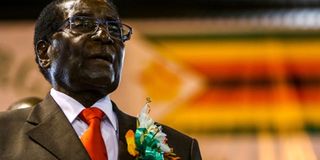Campaign group claims Zimbabwe diamonds funding government repression

Frustration at Zimbabwe's economic collapse under the authoritarian regime of President Robert Mugabe prompted a series of large street protests last year, with many demonstrators beaten by security forces.
What you need to know:
An international embargo was imposed on Zimbabwean diamonds following the atrocities which was lifted in November 2011.
Zimbabwe's ruling elite has diverted the country's vast diamond riches to help fund repression by dodging sanctions and raising money for security forces, an anti-corruption campaign group alleged Monday.
In a report, Global Witness accused top security and political leaders of secretly profiting from the trade in the country's diamond reserves while depriving the impoverished nation of much-needed revenue.
The Central Intelligence Organisation (CIO) spy agency is alleged to have held a concealed stake in a company active in the Marange diamond fields in eastern Zimbabwe, according to secret documents Global Witness said it had seen.
The group's report, "An Inside Job", suggests that diamonds produced by the CIO-linked company were traded in Antwerp and Dubai -- two of the world's leading precious stone marketplaces -- and may have funded political repression.
"Companies have concealed their finances and shielded their operations from public scrutiny, hiding significant stakes in these companies held by the feared Central Intelligence agency, the Zimbabwean military and the government itself," Global Witness said in a statement.
Phone calls made to the ministers of defence, state security and mines seeking comments, were not answered.
A military-linked company subject to European sanctions, Zimbabwe Defence Industries, is alleged to have held a share in another major mining company through two holding firms.
That mining operation has freely traded diamonds in Europe, possibly breaching EU sanctions rules.
'Secretive cabal'
"Elements within both the CIO and military have been heavily implicated in stifling political opposition and scores of human rights violations," the report said.
Frustration at Zimbabwe's economic collapse under the authoritarian regime of President Robert Mugabe prompted a series of large street protests last year, with many demonstrators beaten by security forces.
Accurate statistics on the production and trade of Zimbabwe's diamonds have never been published meaning that the scale of the pillaging of the country's mineral wealth has been hidden from public view, the report added.
In 2013 a parliamentary committee reported "serious discrepancies between what government receives from the sector and what the diamond mining companies claim to have remitted to the Treasury".
Zimbabwe's diamonds, discovered in 2006, have frequently been the subject of controversy.
Global Witness suggested in 2012 that the CIO may have received some $100 million (83 million euros) and a fleet of 200 cars from a Hong Kong-based businessman in exchange for diamonds traded outside official channels.
The Marange fields are one of Africa's biggest diamond finds in recent years.
The army cleared small-scale miners from the area in 2008 in an operation that Human Rights Watch says killed more than 200 people.
An international embargo was imposed on Zimbabwean diamonds following the atrocities which was lifted in November 2011.
"A find that offered such promise to the people of Zimbabwe has delivered only disappointment primarily serving a secretive cabal of vested political and economic interests," said Michael Gibb, a conflict resources expert at Global witness.




